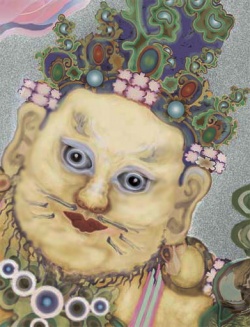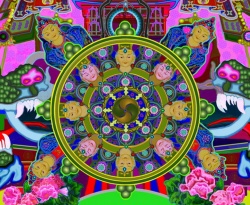Buddha Neuroses (Dullness, Introversion, self-centredness)
Dullness, Indifference And Self-Absorption
According to Buddhist Cosmology, there are many levels of heaven within what are considered heavenly realms. Each of these levels of heaven, according to the Buddhist teachings, is the result of attachment to a certain level of our basic awareness. Wherever we settle our minds and decide that this is the highest or most desirable level of awareness, that's where we stay or that's as high as we get.
If we don't feel that there is something better or more pleasurable, or more all-encompassing, then we cannot even see beyond the level that we're at. Our belief is what stops us from looking further. It is like the person who doesn't know much about Europe, and so has no inclination to go there. If someone tells them how great Europe is, and how many interesting things there are, then they might be tempted to check it out and work out how to travel there. Otherwise, they don't bother with it and never end up with any real idea about what Europe is like.
We do the same thing with our levels of awareness. Until we hear someone talk about the benefits of heaven, or that heaven even exists, or that higher levels of awareness and well-being are possible, then we have no inclination to find out how to get there or to find out what it's like.
We spend our time focussing on the immediate world around us and stay within the comfort of our current world-view and self-definition. A large part of the Buddha family neurosis has to do with this sense of comfort and our unwillingness to look outside of our current circumstances or our inability to relate to situations outside of our current level of understanding.
All of this is a reflection of our getting carried away with our current level of awareness and understanding. We tend to feel and act as if we know it all. There is a tendency with this neurosis to feel self-satisfied. The sense we get of being in control can lead to us becoming preachy regardless of whether we are aware of all aspects of a particular situation or not. We are assuming that our level of awareness is the only one possible. We assume that we know everything that needs to be known. This is the height of ignorance and leads to a tremendous amount of indifference arising in the minds of people with Buddha family neuroses.
Our sense of unity and fulfillment within our own level of awareness can lead us to be overly blissful and therefore out of touch. It can also, because of this, lead to complacency. Our sense of satisfaction is so complete that even under strong signals, we don't react. It's like meditating in our room and resisting acting while the house is burning down or someone has an accident right in front of us and we don't respond.
The problem with all of these above states is that we are settling for a lower level of awareness than the ultimate basic awareness that underlies everything. Completely all-encompassing wisdom does not exclude anything, it doesn't hold onto or settle for any set of circumstances or any particular level of awareness.
All-Encompassing Awareness adjusts itself according to the requirements of the world around it. It includes the problems and issues that may normally be outside of our regular experience. It recognizes the changability of the world around us and the importance of others' reactions to events in their world and how it affects ours.
This assumption of already knowing everything that needs to be known and being indifferent to all the rest is all how beings in the "heavenly" realms lose touch with the sufferings of the lower realms and become blissful and pre-occupied with their own entertainment and enjoyment.
Next, we can also have difficulty with awareness and be over-sensitive to the point where we feel compelled to shut-down. Everyone is shut down to some degree, but some people have difficulty dealing with any kind of awareness of certain parts of their world. It's like a type of blindness, self-imposed, of course.
We tend to resist change that would force us into a new understanding or a new level of awareness. We tend to dismiss any issues and problems in the world around us solely because they don't fall within what we feel comfortable handling or because they cause us confusion.
We tend to hold too tightly to space and hide from or reject the world around us. We can also dismiss or ignore things because we do not consider them to be important, or worth paying attention to. We are so detached from the world that we don't realize that we still need to operate within it. It's like being able to see the entire ant hill and so we are detached from the ant level problems, but we forget that we are still an ant and have to do certain things in order to survive and lead an ant's life.
Our tendency to ignore the things around us leads us to be careless. Someone with Buddha family neuroses leaves lots of dishes in the sink, and leaves their clothes on the floor. Their house is messy, and they don't seem to finish anything. They do not pay any attention to detail and so miss a great deal of things and make mistakes.
If we have the Buddha family neurosis, we can be overwhelmed by all the possible things to be aware of. This can lead to a continual state of confusion. Quite often, repeated confusions that are not dealt with as they arise, lead to a state of confusion that is disconnected from the world around it and disconnected from the things that started the confusions in the first place. We end up being confused and unsure, but we don't know why.
This disconnected confusion leads to indecisiveness. Another difficulty with Buddha Family neurosis is that, being aware of a larger number of possibilities, also causes indecisiveness. The more frequent the confusion and indecisiveness becomes, the greater the possibility of being confused and the greater the chance of being unable to decide what to do.
In line with the confusion and indecisiveness, procrastination also becomes part of this neurosis. We begin to put off things because we're confused or because we can't make up our minds or we don't want to be forced into a decision or situation that we may not like. We also put things off in order to avoid being aware of things that we'd rather not think about.
We become like an agoraphobic, who's afraid to leave their house because of what MIGHT happen. We become very hesitant and withdrawn. We reduce our involvement with outside situations and with people and their emotions, out of fear of becoming aware of something that we can't handle or of being exposed to too much information. This can cause tremendous isolation, and introversion. We end up being even more self-absorbed than we would be normally.
So Buddha Family neuroses can go from the extreme of being self-absorbed, detached, and indifferent because of our ability to be aware and to connect with space and our sense of space, to being indifferent and withdrawn because of fear of having to deal with situations beyond our understanding or that might take us beyond our current level of awareness.
Either way, we stop developing our awareness, either because we think we already know it all, or because we are afraid of what we might find out.
In order to eliminate these neuroses, we need to understand the nature of awareness itself and learn to become relaxed with all levels of awareness, and we need to develop the ability to move from one level of awareness to another. The way to do this is through the perfections of concentration and wisdom.



